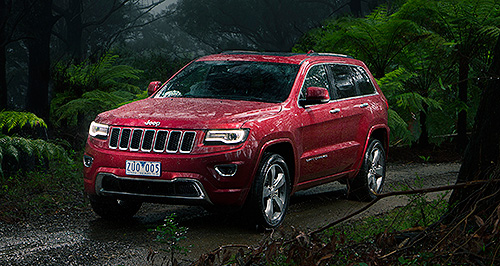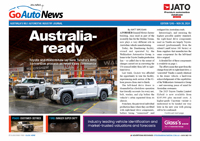Make / Model Search
New models - Jeep - Grand CherokeeDriven: Facelifted Jeep Grand Cherokee checks inStep up: Jeep has instigated a range of premium-enhancing upgrades on its facelifted Grand Cherokee. New $43k rear-drive option headlines updated Jeep Grand Cherokee range5 Jul 2013 JEEP Australia has launched its upgraded Grand Cherokee, headlined by a new $43,000 rear-drive entry offering, a new eight-speed automatic transmission, a punchier diesel engine and revised interior and exterior styling. Available from a special price of $45,000 drive-away, the WK Series II Laredo petrol-only 210kW/347Nm V6 rear-drive entry offering is the first two-wheel-drive model to wear the famous badge. By removing the off-road mechanical bits, Jeep saves 86kg and customers save $3000, putting the Grand Cherokee right in the Ford Territory and Toyota Kluger 2WD heartland. A 2WD turbo-diesel version will not be offered at this stage, although we understand one is waiting in the wings for launch at a later date. However, the cheapest 4x4 variant – Laredo V6 4WD – is now $1000 more expensive from $46,000 plus on-road costs. Also, the tailgate window no longer flips open, even though the door structure is fundamentally unchanged. It’s a move dictated by American consumers apathetic to it, Jeep claims. Offsetting the price hikes and reduced versatility are specification and functionality improvements, including the three extra forward gears with paddleshifts for the all-new automatic and HID High Intensity Discharge headlights with daytime driving lights on all models. Furthermore, the Grand Cherokee sees a step up in safety technology, with trailer-sway control now standard, while adaptive cruise control, blind-spot warning, and cross-path rear detection systems are available. According to one senior spokesman, Jeep isn’t currently offering a 2WD diesel right now because the high cost of the VM Motori and ZF drivetrain combo demand premium pricing that can only be charged with the 4WD hardware. Jeep chief engineer John C Mrozowski revealed at this week’s local launch that the facelift program commenced in January 2011, just months after US sales for the fourth-generation Grand Cherokee started in April 2010. It was driven by then-new Fiat Group overlord Sergio Marchionne’s desire for Jeep to capitalise on its strongest model with up-to-the-minute upgrades in terms of styling, technology, and interior quality, while addressing buyer resistance concerning fuel consumption and carbon dioxide emissions with premium SUV segment-competitive eight-speed automatic technology. The visual changes are designed to make the Grand Cherokee appear more upmarket, and include a raised front fascia, slimmer headlights, a shorter grille, higher fog light placement, revised bumpers, a reshaped air intake, redesigned alloy wheels, larger tail-lights, restyled tailgate sheetmetal, a more aerodynamic spoiler, model-specific rear diffusers and fresh colour choices. On the inside the centre stack has been re-jigged with new touchscreen and climate control interfaces, the instruments are now a combination analogue/digital display with a more comprehensive trip computer, there is a different steering wheel (flat-bottomed and heated in the SRT flagship), remoulded T-bar shifter, and additional media connectivity ports fitted. The latter forms part of a single-platform comfort and infotainment system Jeep dubs Uconnect, with fast touchscreen interface and customisable multi-view instrument cluster display. Among its many new features include voice command for audio, communication, climate control and satellite navigation devices where fitted. Right now there are 10 variants to choose from, ascending from the V6 petrol-only 2WD Laredo, V6 petrol/V6 diesel 4WD Laredo, V6 petrol/V6 diesel/V8 petrol 4WD Limited and Overland, and V8 petrol 4WD SRT. The off-road focussed Trailhawk will return at a later date as a permanent edition to the range. The standard 3604cc 3.6-litre all-aluminium 60-degree petrol engine with double overhead camshafts and variable valve timing develops the same 210kW of power at 6350rpm and 347Nm of torque at 4300rpm as before. However, in 4WD models fuel consumption is cut 5.4 per cent thanks to the ZF-built eight-speeder ousting the old Mercedes-supplied five-speed auto: 10.4 litres per 100km (and 244 grams per kilometre of CO2 emissions) versus 11.4L/100km (and 265g/km). In the base rear-wheel drive Laredo the figures fall to 10.1L/100km and 237g/km. Next up is the continuing 5654cc 5.7-litre pushrod overhead valve Hemi V8 delivering the same 259kW at 5200rpm and 520Nm at 4200rpm. But aided by the ZF transmission and fuel-saving Multi-Displacement System (MDS), consumption is 11 per cent down, to 13L/100km and 304g/km. At 7.3 seconds to 100km/h and a 225km/h top speed, the Euro-6 rated Hemi is 1.0s and 19km/h faster than the Pentastar. But both are comprehensively pipped by the barnstorming SRT’s 5.0s and 257km/h V-max, thanks to its 6471cc 6.4-litre version of the V8 Hemi, pumping out 344kW at 6250rpm and 624Nm at 4100rpm, while slurping down 14L/100km (down just 0.1L/100km) and emitting 327g/km of CO2. On the diesel front, the overhauled 2987cc 3.0-litre V6 turbo-diesel by VM Motori of Italy gains 7kW and 20Nm, to register in at 184kW at 4000rpm and 570Nm at 2000rpm – some 800Nm lower than before for improved responses. While the petrols are all Euro 6-rated, this one achieves a Euro 5+, even though it is now 10 per cent more economical (7.5L/100km) and cleaner (198g/km) than before. It’s also faster to 100km/h than the Pentastar V6 by 0.1s. To help improve fuel consumption on all models, the German-made ZF eight-speeder features an ‘Eco Mode’ that optimises the transmission’s shift schedule as well as throttle sensitivity. The range tips the tare mass scales from 1998kg (Laredo 2WD V6) to 2289kg (SRT). The former’s maximum-braked towing capacity is 2812kg while the latter’s is 2949kg, but the diesel and Hemi top both at a whopping 3500kg. Like its predecessor, the Grand Cherokee is a monocoque body design, and is related to the current Mercedes M-Class (a throwback to the old Daimler Chrysler days). Length/width/height and wheelbase measure in at 4828/1943/1802/2915mm respectively – except for the SRT (4846/1954/1749/2914mm). Models with air suspension see the standard height fall to 1792mm. Of course Jeep infuses its trademark off-road capabilities by employing torque-on-demand 4WD on all but the base 2WD Laredo. All are “Trail Rated” by meeting five key 4x4 criteria: traction, ground clearance, manoeuvrability, articulation, and water fording. Three 4x4 systems are available: Quadra-Trac II is a two-speed transfer case, channelling up to 100 per cent of torque to the axle with most traction in 4WD High, and 50/50 lock in 4WD Low – aided by a 2.72 gear reduction ratio. The Quadra-Drive II employs an Electronic Limited-slip Differential to deliver torque to whichever wheel requires it most, has drive split 48/52 front/rear in normal conditions, and also includes the 4WD High/Low ranges. Meanwhile, Quadra-Trac Active on the SRT is a more on-road biased system, capable of transferring up to 100 per cent torque to one rear wheel with better grip, eliminating rear-wheel spin for better handling on bitumen, helped out by Brake Traction Control System on the front differential. Air suspension is standard on the Overland and optional on the others except SRT for a circa $3000 premium. It varies ride height settings ranging from 167mm to 271mm, according to requirements. The Land Rover-style ‘Selec-Terrain’ traction control system is standard on all models (again except the SRT), and allows the driver to choose five different drive systems according to the external environments via a console-mounted rotary knob. It offers default Auto, Sand, Snow, Mud, and Rock – the latter raising to the vehicle to maximum ground clearance if fitted with Quadra-Lift. Sport is accessible via the redesigned transmission lever. In extreme off-road ‘2’ setting, and the detachable front air dam removed, the Grand Cherokee with Quadra-Lift can tackle approach, departure (to rear recovery tow hook) and breakover angles of 35.8, 29.6, and 23.5 degrees respectively. On regular steel springs the figures change to 26/19/24 degrees respectively. More than a dozen powertrain, braking and suspension systems work in unison to make Selec-Terrain work, and include the standard anti-lock brake, stability and traction controls, Electronic Roll Mitigation, Hill-Start Assist, and new Hill-Start Ascent as well as Descent controls with speed adjustability via the standard paddle shifters. The latter is a boon for tackling steep grades, but back on bitumen the optional improved Forward Collision Warning with Crash Mitigation now automatically stops the vehicle if the driver fails to do so, and works in conjunction with a new brake-pressure assist system that applies maximum force pressure. Of monocoque construction, the Grand Cherokee continues with the short/long arm independent front end and multi-link rear suspension set-up, and includes support cradles as well as longitudinal rails to enhance strength, dynamics, and refinement. Steering is hydraulically powered rack and pinion on V8s and electro-hydraulic on the V6 and diesel, while brakes are 328mm x 30mm vented discs up front (SRT: 350m x 32mm six-piston Brembo callipers), and 320mm x 14mm (SRT: 330mm x 22mm four-piston Brembo callipers) solid discs in the rear. The Laredo rides on P265/60 R18s, the Limited and Overland on P265/50 R20s, and SRT on P295/45 ZR20s. Standard features on the base Laredo 2WD V6 include Bi-Xenon HID headlights, keyless entry and start, automatic climate control, Uconnect touchscreen with Bluetooth audio and phone connectivity, power and heated front seats, and a reversing camera. According to Mr Mrozowski, the latest Grand Cherokee was developing using Sergio Marchionne’s “how can we take something good and make it great” mantra. All Australian-bound vehicles are built at Jefferson North Assembly plant in Detroit – the home of the Grand Cherokee since the first one was made in 1992.
 Quick testsRead moreAll new models Alfa Romeo Alfa Romeo Abarth Abarth Alpine Alpine Alpina Alpina Audi Audi Aston Martin Aston Martin BMW BMW Bentley Bentley Chery Chery Brabham Brabham Chrysler Chrysler Chevrolet Chevrolet Cupra Cupra Citroen Citroen DS DS Dodge Dodge Fiat Fiat Ferrari Ferrari Foton Foton Ford Ford Great Wall Great Wall FPV FPV Haval Haval GWM GWM Honda Honda Holden Holden Hyundai Hyundai HSV HSV Isuzu Isuzu Infiniti Infiniti Jeep Jeep Jaguar Jaguar Lamborghini Lamborghini Kia Kia LDV LDV Land Rover Land Rover Lotus Lotus Lexus Lexus Maserati Maserati Mahindra Mahindra McLaren McLaren Mazda Mazda Mercedes-Benz Mercedes-Benz Mercedes-AMG Mercedes-AMG Mini Mini MG MG Nissan Nissan Mitsubishi Mitsubishi Pagani Pagani Opel Opel Porsche Porsche Peugeot Peugeot Ram Ram Proton Proton Rolls-Royce Rolls-Royce Renault Renault Saab Saab Rover Rover Smart Smart Skoda Skoda Subaru Subaru SsangYong SsangYong Tesla Tesla Suzuki Suzuki Toyota Toyota Volvo VolvoGrand Cherokee pricing
Motor industry news |
|
||||||||||||||||||||||












Facebook Twitter Instagram